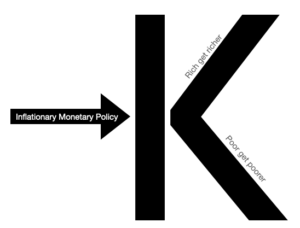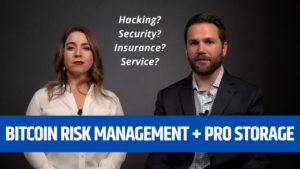
2008 was a very interesting year to say the least. Possibly the most productive outcome of the year was the restless message of “rethink things” coming from the little voice beckoning each of us in our minds.
Myth #1… The SEC keeps investment information honest and accurate
The Securities and Exchange Commission (abbr “SEC”) should be done away with. The Madoff debacle along with the dozens of other securities frauds that draw less (or no) attention every single year should be evidence that the SEC is failing. It is tasked with making investments safe and transparent and is having the opposite effect. When an investor or fund manager is considering a particular investment, they believe that the investment is truthful, transparent, and honest because the SEC is supposed to regulate it into such a position. The result can be decreased due diligence because of reliance on the SEC. This leads to disaster when the SEC ends up not doing its job very well. If we didn’t expect the SEC to be “keeping investing safe and honest” then investors and asset managers would take a closer look at investment opportunities which would result in better thought out decisions. I’m not saying the SEC should be doing a better job – I’m saying we shouldn’t expect regulation to create investment safety in the first place.
I believe the SEC does more harm than good by offering a false sense of security.
Myth #2… Financial planners give good investment advice
Something very interesting happened in the last 15 or so years: Stock brokerages spent millions of dollars convincing the American public that securities salesman had become “financial planners”. That move alone shifted the perception of almost every American and the magnitude of Wall Street’s success (theirs, not yours). A “stock broker” is to securities as a car salesman is to cars… but a financial planner sounds a lot like somebody whose job it is to plan your finances. What actually changed to make stock brokers become financial planners? Nothing more than the name and some whiz-bang software and charts to support the faux expertise. Most financial planners are still technically licensed to sell securities (stocks, bonds, and funds) and still primarily earn their living by selling securities and insurance.
If all cars on the road starting randomly exploding, then we wouldn’t be surprised to hear car salesmen and oil company representatives say “Don’t worry, just keep driving your car. Everything’s going to be okay. In fact you might want to trade your car in for a better one. Don’t worry, we have statistics that show that driving a car regularly is very safe and it’s the best way to get around.” Still, in such a case your logic might say Gee, if I don’t want to explode I should stop driving my car since cars have started regularly exploding.
On the other hand, when our securities holdings start self destructing, we forget to include the grain of salt while listening to the securities salesman (financial planner) say, “Don’t worry, just keep buying securities. Everything’s going to be okay. In fact, you might want to rebalance your portfolio and buy and sell some securities right now for better diversification. Don’t worry, we have statistics that show that the stock market is good investment over the long run.”
The fact is that financial planners, whom are truly securities salesman, have no training in assets or investment strategies outside of securities. There’s a whole world of assets and investments outside of publicly traded securities, and anybody whose training and compensation is solely related to the securities market is, in reality, going to be quite useless when it comes to financial planning.
Myth # 3… Smart people are smart
All kinds of very educated people created CDOs, credit default swaps, and a variety of complex derivatives which severely magnified the bubble economy that has turned the world’s finances upside down. These were people with MBAs and other credentials that suggested that their ideas were good. A farmer could have walked into the board room where CDOs were being invented, and he would have said “I don’t understand this stuff; it’s too complex – smells fishy.” For the small time investor and institutional investor alike, we’ve been reminded that things we don’t understand can have unpredictable and undesirable results.
Myth # 4… Past results predict future performance
Every single investment disclosure document says that past performance is no guarantee of future results. It’s part of how the SEC tries to protect people from misleading marketing. Yet, almost every investment strategy promoted by Wall Street is based on the idea that past results will predict future performance. Right now there’s tons of info floating around relating to the Great Depression as an indicator of what to expect from our current recession/depression. Forget about it – it’s less useful than male nipples. The Great Depression was in the industrial age. We are in the information age now. During the Great Depression our money was on the gold standard. Today, the gold standard is long gone, and measuring anything in dollars is like using a wobbling yardstick.
Past results do not necessarily predict future performance.
Myth # 5… I should do what everyone else is doing
The crowd used to agree that the world is flat. The crowd use to agree that humans can’t fly. The crowd used to consider cocaine and heroin as medical treatments. The crowd used to consider smoking cigarettes as safe and healthy. Need I say more?
Think for yourself. It pays off in spades.
### Recommended reading:
- Bail Yourself Out with an Unlimited 401k
- Turn Doom & Gloom into Personal Boom
- Weak economy strengthens the incentive for a Solo 401k
![]() Subscribe ::
Subscribe ::  del.icio.us ::
del.icio.us ::  Digg this ::
Digg this ::  Stumble it ::
Stumble it ::  facebook
facebook
 ::
::  ::
::  ::
::  ::
::  ::
::  ::
::  ::
::  :: [What are these icons for?]
:: [What are these icons for?]


